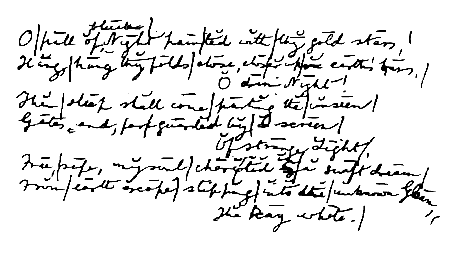Sri Aurobindo
Letters of Sri Aurobindo
Volume 2. 1934 — 1935
At first sight your metre seemed to me impossible in English, especially because of the four short syllables at the end of two lines and the five short syllables in two others. English rhythm hardly allows of that – quantitatively it can be managed, but five unaccented unstressed syllables altogether even if it can be done once in a way causes an extreme difficulty when it is made a regular feature of the metre. But it seems that there is hardly anything impossible in the realm of metre and I succeeded after all subject to one change, the substitution of a long for a short syllable at the end of the fourth and fifth lines. I suppose I could have avoided even this concession if I had fallen back on the device of unrhymed verse, but I wanted to use rhyme. However after finishing I found my stanza right enough as metre, but poor in rhythmic opulence, something bald and lame. So I had to make yet another concession; I took the option, used in all but one line, 


 to prefix a naturally superfluous syllable to each or any line. I give you the finished stanza below; if you want to get it such as I originally wrote it, you have only to strike off the first syllable or word in each line except the fifth; but it is better rhythm and better poetry as it is.
to prefix a naturally superfluous syllable to each or any line. I give you the finished stanza below; if you want to get it such as I originally wrote it, you have only to strike off the first syllable or word in each line except the fifth; but it is better rhythm and better poetry as it is.
O1 pall of black Night painted with thy gold stars,
Hang, hang thy folds close, closer upon earth’s bars,
O dim Night!
Then sleep shall come parting the unseen
Gates and, far guarded by a screen
Of strange Light,
Free, safe, my soul charioted in a swift dream
From earth escape stepping into the unknown Gleam
The Ray white.

I hope you will find this satisfactory in spite of the two departures from your model.
P.S. In Horace’s line upon the eloquence and order, I have found that I dropped a word and truncated the hexameter. I have restored the full line.



 to prefix a naturally superfluous syllable to each or any line. I give you the finished stanza below; if you want to get it such as I originally wrote it, you have only to strike off the first syllable or word in each line except the fifth; but it is better rhythm and better poetry as it is.
to prefix a naturally superfluous syllable to each or any line. I give you the finished stanza below; if you want to get it such as I originally wrote it, you have only to strike off the first syllable or word in each line except the fifth; but it is better rhythm and better poetry as it is.